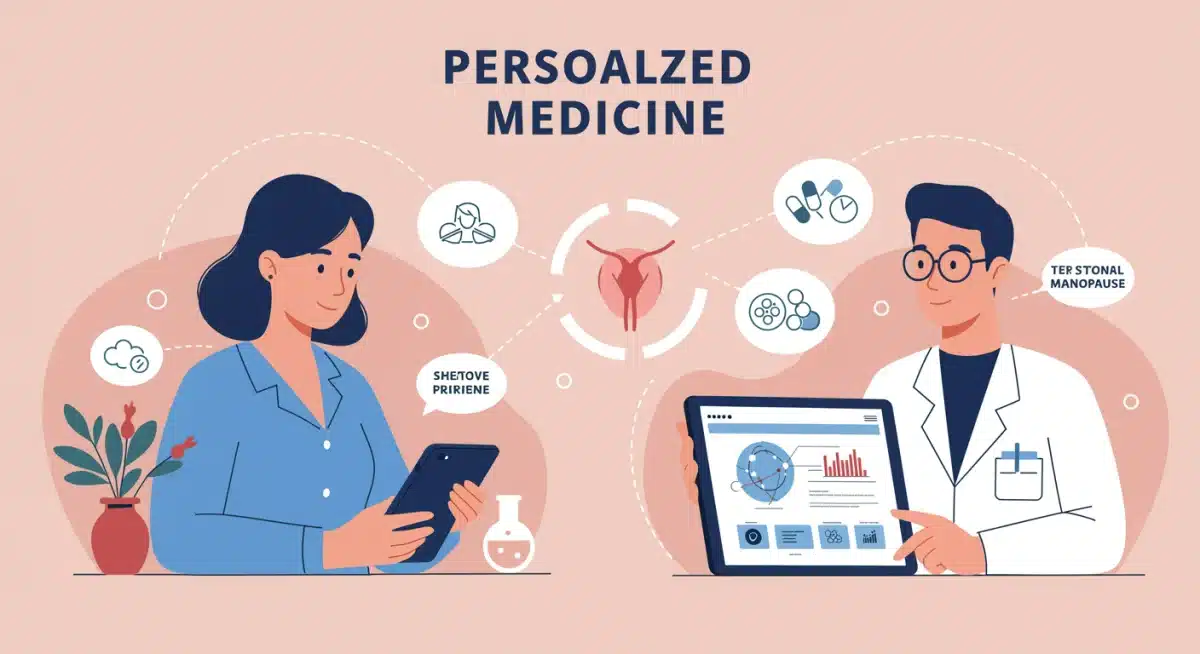Navigating Perimenopause & Menopause in 2025: Updates & Holistic Care

Advertisements
The landscape of perimenopause and menopause management in 2025 is evolving, offering updated treatments and holistic approaches to effectively manage symptoms and improve quality of life for women.
Navigating Perimenopause and Menopause in 2025: Updated Treatments and Holistic Approaches to Manage Symptoms (RECENT UPDATES, PRACTICAL SOLUTIONS) is shaping today’s agenda, with new details emerging from medical experts and research institutions. This update prioritizes what has changed, why it matters, and what women’s health needs to know now to make informed decisions about their health.
Understanding the Evolving Landscape of Menopause Care in 2025
As we move further into 2025, the medical community continues to refine its understanding of perimenopause and menopause, offering more nuanced and personalized care. This evolution is driven by ongoing research into hormonal changes, symptom presentation, and the long-term health implications for women. The focus is increasingly shifting towards proactive management and an integrated approach that addresses both physical and emotional well-being.
Recent studies highlight the critical importance of early intervention in perimenopause to mitigate more severe symptoms later. Healthcare providers are now better equipped to diagnose perimenopause earlier, often before significant hormonal fluctuations become apparent, allowing for more timely and effective support. This proactive stance aims to empower women with knowledge and tools to navigate this transition with greater ease and fewer disruptions to their daily lives.
Key Shifts in Diagnostic Approaches
- Advanced Hormone Profiling: Beyond basic estrogen and FSH tests, comprehensive panels now offer a more detailed picture of hormonal balance, guiding personalized treatment.
- Symptom-Based Diagnostics: Greater emphasis on a woman’s unique symptom profile, rather than solely relying on age or blood tests, for a holistic diagnosis.
- Digital Health Tools: Wearable devices and apps are increasingly used to track symptoms, sleep patterns, and mood, providing valuable data for clinicians.
The updated guidelines for perimenopause and menopause care in 2025 emphasize a shared decision-making model. This means women are active participants in choosing their treatment paths, informed by their individual health history, preferences, and lifestyle. This collaborative approach fosters greater trust and ensures that care plans are truly tailored to individual needs.
Updated Hormone Therapy Options and Considerations
Hormone Replacement Therapy (HRT), now often referred to as Menopausal Hormone Therapy (MHT), remains a cornerstone of treatment for many women experiencing moderate to severe menopausal symptoms. However, 2025 brings further refinements in its application, focusing on individualized dosing, delivery methods, and a clearer understanding of benefits versus risks for different patient profiles.
New formulations and delivery systems are expanding choices, offering more precise control over hormone levels and potentially reducing side effects. Transdermal patches, gels, and sprays are gaining popularity as they bypass the liver, which can be advantageous for some women. The conversation around MHT is less about a blanket recommendation and more about a carefully considered, personalized approach based on a woman’s specific health status and symptom burden.
Emerging MHT Formulations and Delivery
- Bioidentical Hormones: Increased availability and research into customized bioidentical hormone preparations, prescribed and monitored by qualified practitioners.
- Low-Dose Options: Further development of ultra-low dose MHT options for women seeking symptom relief with minimal systemic exposure.
- Tissue-Specific Estrogens:1 Research into estrogens that target specific tissues (e.g., vaginal tissue) to address localized symptoms without systemic effects.
It’s crucial for women to have an open and detailed discussion with their healthcare provider about their personal medical history, including any family history of cancer or cardiovascular disease, to determine if MHT is the right option for them. The decision to start or continue MHT should always be a joint one, regularly reviewed, and adjusted as circumstances change.
Non-Hormonal Pharmacological Solutions in 2025
For women who cannot or prefer not to use MHT, the landscape of non-hormonal pharmacological treatments continues to expand, offering effective alternatives for managing various menopausal symptoms. These options provide crucial relief, particularly for hot flashes, night sweats, and mood disturbances, without involving exogenous hormones.
Selective serotonin reuptake inhibitors (SSRIs) and serotonin-norepinephrine reuptake inhibitors (SNRIs) are well-established for managing vasomotor symptoms and mood swings. However, 2025 is seeing the introduction of novel compounds specifically designed to target the thermoregulatory center in the brain, offering a new class of non-hormonal treatment that promises more targeted relief with potentially fewer side effects.
Innovations in Non-Hormonal Treatments
- Neurokinin B (NKB) Receptor Antagonists: New drugs like fezolinetant are showing significant promise in clinical trials for reducing hot flashes by targeting specific neurological pathways.
- Gabapentin and Pregabalin: Continued use and refined understanding of these medications for managing hot flashes, particularly in women with sleep disturbances.
- Clonidine Re-evaluation: A renewed look at clonidine for vasomotor symptoms, often used in conjunction with other therapies for enhanced efficacy.
These developments underscore a growing commitment to providing diverse and effective treatment pathways tailored to individual needs and preferences. Women are encouraged to explore all available options with their doctor to find the most suitable non-hormonal solution.
Holistic Approaches and Lifestyle Interventions for Symptom Management
Beyond pharmacological interventions, holistic approaches and lifestyle modifications remain powerful tools in navigating perimenopause and menopause in 2025: updated treatments and holistic approaches to manage symptoms (recent updates, practical solutions). These strategies emphasize overall well-being and can significantly alleviate symptoms, often complementing medical treatments.
Integrative medicine is gaining more traction, combining conventional Western medicine with complementary therapies. This approach acknowledges that menopause is a multifaceted experience influenced by diet, exercise, stress levels, and emotional health. Practical solutions now focus on personalized wellness plans that empower women to take an active role in managing their health during this transition.
Key Holistic Strategies and Practical Solutions
- Nutritional Optimization: Emphasizing a diet rich in phytoestrogens, omega-3 fatty acids, and calcium, with personalized dietary plans to address specific deficiencies or symptoms.
- Mind-Body Practices: Techniques like mindfulness meditation, yoga, and tai chi are increasingly recommended for stress reduction, mood regulation, and improved sleep quality.
- Regular Physical Activity: Tailored exercise routines, including strength training and cardiovascular exercise, to support bone health, manage weight, and boost mood.
The integration of these holistic practices into daily life can lead to substantial improvements in symptom management and overall quality of life, fostering a sense of control and well-being during this significant life stage. It’s about creating a sustainable lifestyle that supports hormonal balance and emotional resilience.

The Role of Personalized Medicine and Genetic Testing
Personalized medicine is revolutionizing how women approach perimenopause and menopause. In 2025, genetic testing and advanced biomarker analysis are becoming more accessible, offering insights into individual predispositions and optimal treatment responses. This allows for highly tailored interventions that move beyond a one-size-fits-all approach.
Understanding a woman’s genetic profile can help predict her risk for certain menopausal symptoms, bone density loss, or even her response to various medications, including MHT. This precision medicine approach aims to maximize the efficacy of treatments while minimizing potential side effects, leading to more effective and safer outcomes for women.
Advancements in Personalized Care
- Pharmacogenomics: Analyzing genetic markers to predict how an individual will respond to specific medications, guiding drug selection and dosing for MHT or non-hormonal treatments.
- Biomarker Analysis: Beyond standard hormone tests, the use of advanced biomarkers to assess inflammation, cardiovascular risk, and bone health, providing a more comprehensive health picture.
- AI-Driven Health Platforms: Utilizing artificial intelligence to analyze vast amounts of health data and genetic information, offering personalized recommendations for diet, exercise, and symptom management.
This shift towards personalized medicine empowers women and their healthcare providers to make highly informed decisions, creating a truly bespoke plan for navigating perimenopause and menopause in 2025: updated treatments and holistic approaches to manage symptoms (recent updates, practical solutions). It represents a significant step forward in women’s health.
Addressing Mental Health and Emotional Well-being
The emotional and psychological impact of perimenopause and menopause is increasingly recognized as a critical component of overall well-being. In 2025, there’s a heightened focus on addressing mental health challenges such as anxiety, depression, irritability, and cognitive changes that often accompany hormonal shifts.
Healthcare providers are now routinely screening for mental health issues during menopausal consultations, moving away from the previous tendency to attribute these symptoms solely to other life stressors. Integrated care models are being adopted, where mental health professionals work alongside gynecologists and general practitioners to provide comprehensive support.
Support for Mental and Emotional Health
- Cognitive Behavioral Therapy (CBT): A highly effective therapeutic approach for managing menopausal symptoms like hot flashes, sleep disturbances, and mood swings.
- Support Groups and Peer Networks: Facilitating connections among women experiencing similar transitions to foster a sense of community and reduce feelings of isolation.
- Mindfulness and Stress Reduction Programs: Structured programs designed to teach coping mechanisms for stress, anxiety, and improving emotional resilience.
Prioritizing mental and emotional well-being is fundamental to successfully navigating perimenopause and menopause in 2025: updated treatments and holistic approaches to manage symptoms (recent updates, practical solutions). A holistic approach ensures that women receive comprehensive care that addresses all aspects of their health during this transformative period.

Future Directions and Research for 2025 and Beyond
The field of perimenopause and menopause research continues to evolve rapidly, with promising new avenues for treatment and management emerging in 2025 and looking ahead. Scientists are exploring novel therapeutic targets, innovative delivery systems, and a deeper understanding of the genetic and environmental factors that influence the menopausal transition.
Ongoing clinical trials are investigating new compounds that could offer symptom relief with greater specificity and fewer side effects. There’s also a significant focus on preventative strategies, aiming to optimize women’s health long before they enter perimenopause, thereby potentially easing the transition when it does occur. This forward-looking perspective promises even more refined and effective solutions in the coming years.
Promising Research Areas
- Stem Cell Therapy: Early research is exploring the potential of stem cells to restore hormonal balance and alleviate severe menopausal symptoms.
- Microbiome and Menopause: Investigating the link between gut health and hormonal fluctuations, potentially leading to probiotic or dietary interventions.
- Non-Invasive Brain Stimulation: Research into techniques like transcranial magnetic stimulation (TMS) for managing mood disorders and hot flashes associated with menopause.
These future directions signify a dynamic and hopeful outlook for women’s health, ensuring that navigating perimenopause and menopause in 2025: updated treatments and holistic approaches to manage symptoms (recent updates, practical solutions) will continue to benefit from cutting-edge science and compassionate care. The commitment to improving women’s lives during this phase is stronger than ever.
Key Aspect |
Brief Description |
|---|---|
Updated Treatments |
New MHT formulations, NKB antagonists, and refined non-hormonal options for symptom relief. |
Holistic Approaches |
Emphasis on nutrition, mind-body practices, and personalized lifestyle changes. |
Personalized Medicine |
Genetic testing and biomarker analysis to tailor treatments for individual women. |
Mental Health Focus |
Integrated care for anxiety, depression, and cognitive changes during transition. |
Frequently Asked Questions About Menopause Management in 2025
In 2025, new non-hormonal options like neurokinin B (NKB) receptor antagonists are emerging, showing great promise for effectively reducing hot flashes. Additionally, updated low-dose MHT formulations and refined applications of SSRIs/SNRIs continue to provide relief for many women.
Yes, Menopausal Hormone Therapy (MHT), formerly HRT, is still a recommended treatment. The focus in 2025 is on personalized approaches, considering individual health profiles, symptom severity, and shared decision-making between women and their healthcare providers to optimize benefits and minimize risks.
Holistic approaches, including nutritional optimization, mind-body practices like yoga, and regular exercise, complement medical treatments by addressing overall well-being. They help manage stress, improve sleep, support bone health, and can significantly alleviate symptoms, leading to a more balanced transition.
Personalized medicine is crucial in 2025, utilizing genetic testing and advanced biomarker analysis to tailor treatment plans. This approach helps predict individual responses to medications and identifies specific health risks, ensuring more effective and safer interventions customized for each woman.
Absolutely. In 2025, there’s a strong emphasis on integrating mental health support into menopause care. Healthcare providers are actively screening for anxiety, depression, and cognitive changes, offering therapies like CBT, and promoting support groups to address the emotional well-being of women.
Looking Ahead: The Future of Menopause Management
The continuous advancements in understanding and managing perimenopause and menopause signal a future where women can expect even more refined, personalized, and effective care. The ongoing research into stem cell therapy, the microbiome, and non-invasive brain stimulation promises revolutionary new options. Women are encouraged to stay informed and engage actively with their healthcare providers to leverage these evolving resources for a healthier, more comfortable transition through this significant life stage.





